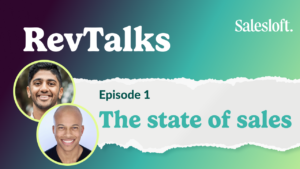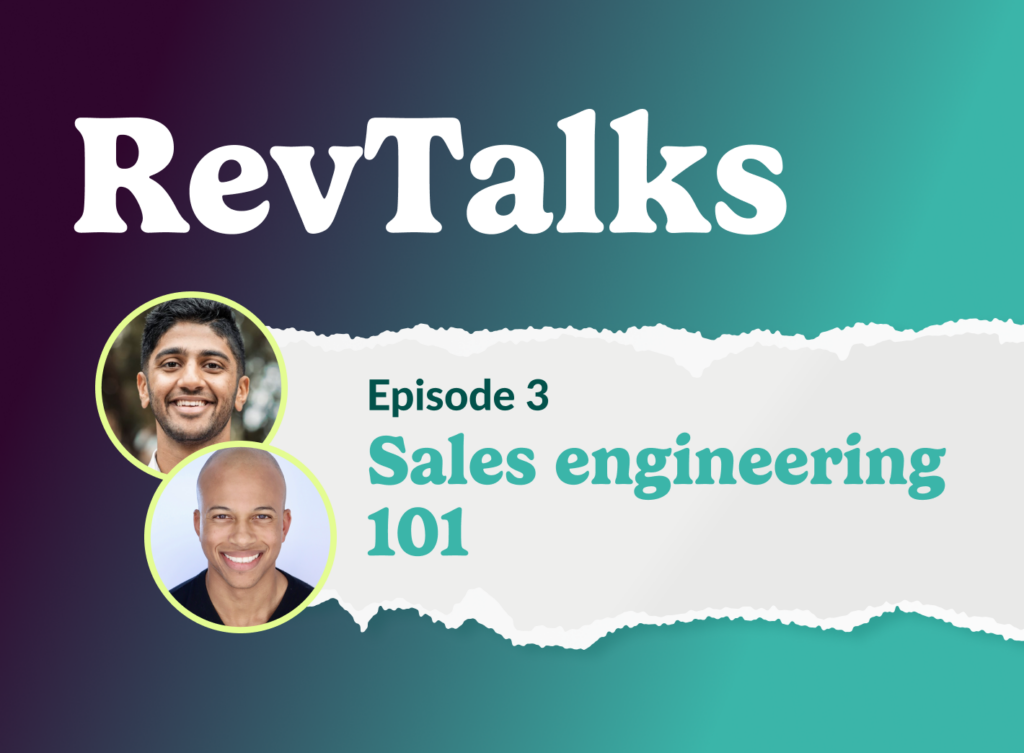If revenue pros are thinking it, we’re saying it. Join us live as go-to-market experts share their best advice and insights from the frontlines of revenue — with tactics you can immediately implement at your organization.
Chris Turner and Rebby John get this question a lot: what does a sales engineer do?
In Episode 3 in our RevTalks series, you’ll hear the experts define the sales engineering role in their own words, how they think AI will change sales engineering in the future, and what it takes to be a world class pre-sales professional.
This interview has been edited for clarity and length.
Role of a sales engineer
Chris:
What does a sales engineer even do, Rebby?
Rebby:
Ultimately the sales engineering role is a revenue function. The role exists in order to drive more revenue for the business. We’re absolutely focused on the same things as an account executive, a salesperson, and an account rep. But we’re doing it from a slightly different lens.
We’re helping buyers buy. It’s our position in the deal cycle to be the credible, trusted advisor. Not just equipped with a perspective on the industry and our product, but also with a very deep perspective on what a customer’s business does and how to align to that business’s strategic priorities and goals to drive net new value.
So I’d say in a nutshell, it’s our job to get the customer to say “yes.”
Chris:
When you boil it all down, my job is to care. My job is to care about your business, my job is to care about outcomes, my job is to care about how we can make you successful. At the highest level, I think that’s what sales engineers really do. They are credible. They care. They’re genuinely curious about their customer’s business. And they love to solve big, hairy, complex problems.
What would you do differently?
Rebby:
Let’s say you had a time machine and you could go back to your first job in pre-sales with all of the context of what it meant to be a top performing AE from your previous role. What would you have done differently over the last couple years?
Chris:
Sales engineering is something that happened to me by accident. I always make that joke when I tell my friends about it, because I didn’t even know that it was a profession that would be right for me.
I have a better understanding of what sales engineering is now. We have all of these components of what makes a successful sales engineer in terms of how we operate with our external customers, but it’s also really important that we understand how we operate with our internal customers as well. What I mean by that is sales engineers operate at the nexus of sales, product, customer success, and all of our other post-sales functions. Even to a degree with marketing and finance. I probably would have broadened my horizons sooner, especially indexing on my relationships with product.
One of the things that I didn’t necessarily appreciate as much as I do now is how important our relationship is with the product team. Inevitably, we’re the ones having in-depth technical conversations with prospects. Product doesn’t get many of those interactions. So we offer a “voice of the customer” to the product team. If I could go back, that’s one of the things that I would’ve done.
Also, reaching out to the product team or people in different departments.
Oftentimes when you’re new in a profession, it can be daunting to try to make those internal connections. But good lord, do they pay dividends later on! When you need to offer value to customers with a unique perspective, those relationships are fundamental to being a successful sales engineer. So that’s the major thing I would change.
AI and sales engineering
Rebby:
With the continued advent of artificial intelligence and automation, how do you see the role of a sales engineer evolving?
Chris:
I think about this in two different ways. What’s going to stay the same and then what’s going to change?
Things that will stay the same
- Our ability to communicate with customers and align to value
- Our level of curiosity and asking compelling questions to deeply understand things the customer’s business
- The expectation for us to be the technical expert in the room
Things that will change
- That bar is going to be raised and those skills are going to be underscored even more
- Account research, industry research, understanding the product are going to be much more readily available and accessible
- The customer is going to have access to that research as well
Think about the advent of marketing automation platforms 10 – 15 years ago. Customers swiftly became more educated about an industry or about a product. I think something similar is going to happen here, where it’s not going to take away from those interpersonal skills. In fact, those are actually going to become more important. Because when we do have a conversation with a customer, they are going to be much more educated about the market, the product that we are selling, and the problems that they’re looking to solve.
Rebby:
Because AI and automation are going to set the bar so much higher, all of those skills that they don’t solve for — the customer facing skills, the confidence, the discovery, the presentation skills — all of those things will be elevated even more.
Advice for newbies
Chris:
What advice would you give to any aspiring sales engineers entering the field today?
Rebby:
Ownership. Ownership is the number one thing that separates a really strong sales engineer from the rest of the pack. Ownership comes in a couple different lenses.
For someone who’s just gotten into a pre-sales role or it’s their first day, I always encourage them to have the mindset that the deals they’re working on are their deals just as much as the account executive’s. Of course, the account executive is the CEO of the deal. They’re responsible for navigating that deal all the way from start to closed won.
But equally, sales engineers are the COO and CTO of that deal. It’s incumbent upon us to internalize that responsibility of helping the buyer buy, and getting the customer to the point where they can say “yes.”
For someone who’s looking to break into the industry, the ownership comes into play in a different way — and that’s by getting yourself ready for your next sales engineering or pre-sales role. Someone reached out to me about a sales engineering role at Salesloft before they had the technical experience and the background that we need from them. I gave them that feedback. Then, the next year, that person was in my inbox once again, but they had done so much work in terms of getting themselves to the point where they were going to be technically competent at the start.
That mindset of ownership was such a big reason why that person is now a top performer at Salesloft.
Define, develop, deliver
Chris:
Break down a role, and you start to think about it at the base level. What is our job?
Define, develop, and deliver a compelling story.
You can do that both when you’re trying to break into the industry, but also while you’re in the industry or while you’re in a sales engineering role.
- Define: Deep discovery skills and ability to understand how to ask good questions and play those back
- Develop: Reaching out to different leaders within the sales engineering industry
- Deliver: The problem that needs to be solved, all the work done against it, all the components that go into making you successful from an outcome standpoint
And so if you follow that framework, you will always be successful from a sales engineering perspective.
Check out the rest of the series
Did this conversation get you to say “yes” to the role of sales engineering? We hope so. They’re a vital part of the modern buyer journey built on a foundation of ownership, curiosity, and care. Working as a part of your existing sales org, they can help you mirror a customer’s internal buying committee, find and validate champions, and solve complex problems. Through AI advances and shifts within the sales industry, this is a role that offers your team a lot impact.
If you enjoyed this article, read part one about the shifting sales landscape or part two where they discuss getting modern deals over the line. Then subscribe to our YouTube channel to get notified whenever we drop fresh sales engineering videos.
 |
 |


